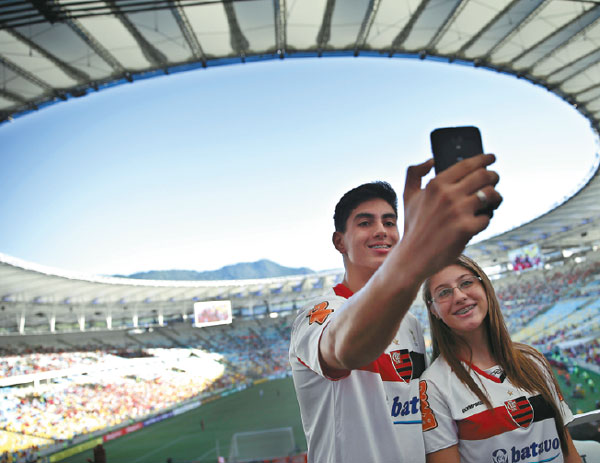Cup communications might be a nightmare
 0 Comment(s)
0 Comment(s) Print
Print E-mail China Daily, May 26, 2014
E-mail China Daily, May 26, 2014
|
|
|
A couple takes a selfie during the Brazilian league match between Fluminense and Flamengo at Maracana stadium in Rio de Janeiro on May 11. |
Imagine ecstatic soccer fans unable to celebrate a World Cup win with real-time Tweets or prevented from posting "self-ies" from inside stadiums.
Or worse, emergency calls blocked by jammed cellphone towers unable to handle the volume.
Those are among the fears as hundreds of thousands of mobile phone-wielding fans get ready to attend soccer's premier event in Brazil.
Experts say Cup visitors will discover that Brazil's mobile communications services are severely lacking, mostly because the government and telephone companies are ill-prepared for the month-long tournament.
Some even worry about possible mobile network blackouts.
Even under the best conditions, voice calls often drop and accessing the Internet on a smartphone is mind-numbingly slow. As last year's protests during the Confederations Cup demonstrated, it can be impossible to use mobile services in a big crowd in a packed soccer stadium.
Government investment was supposed to remedy the problem before the World Cup. Leaders promised blazing-fast 4G mobile networks in the 12 cities hosting the matches, but that didn't happen.
"We've learned from the Confederations Cup, and put specific trucks outside the stadium to enhance the connectivity," said Thierry Weil, FIFA's marketing director.
"But at the end of the day, to be honest, having 70,000 in a stadium, where everybody wants to make a phone call at halftime, well, I'd say you better talk to your boyfriend or girlfriend ahead of the game."
In a worst-case scenario, the mobile communications systems could be so overloaded that people may not be able to call first responders in an emergency, said Christopher Gaffney, a visiting professor at Rio's Federal Fluminense University whose research focuses on Brazil's preparations for the World Cup and Olympics.
"World Cup visitors won't be able to communicate the way they want to," said Gaffney.
"Instagram, Twitter; social media will not function at world class levels but at Brazilian levels, so people visiting Brazil will experience the frustrations we face every day."
The problems with Brazil's mobile services have emerged as demand has soared while the infrastructure for delivering them failed to keep pace.
There are more than 272 million active cellphone lines in the country of 200 million people, according to the telecommunications regulator Anatel. The resulting spotty coverage makes telecommunications among Brazil's most loathed industries.
Telephone companies blame municipal governments for what they say is excessive red tape required to construct more cellphone towers to improve mobile services. But government officials complain that the telecommunications companies have greedily signed up tens of millions of Brazil's new middle-class consumers without adequately improving infrastructure.
Big events have shown what can happen when Brazil's communications networks are overloaded.
Networks couldn't handle the crush last year when 1 million people flocked to Copacabana for Pope Francis' first international visit, practically making a miracle necessary to send an Instagram photo.
During last year's big street protests, demonstrators could rarely use their phones to make calls or post photos or videos of Brazil's largest demonstrations in a generation.
During the final of the Confederations Cup, a dress rehearsal for the World Cup, it was nearly impossible to send a text message or make a call from inside Rio's Maracana stadium.







Go to Forum >>0 Comment(s)